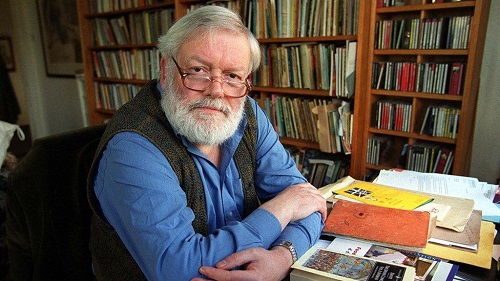De Amerikaanse schrijver en journalist Joseph Mitchell werd geboren op 27 juli 1908 in Fairmont, North Carolina, op de boerderij van zijn grootouders van moederskant als zoon van Averette Nance en Elisabeth A. Parker Mitchell. Het familiebedrijf, dat actief was in de katoen- en tabakshandel, stelde de familie in staat Mitchell zijn hele leven te onderhouden. Mitchells eerste werk, “Joe Gould’s Secret” (1964), profeteerde ook de laatste decennia van zijn eigen leven. Van 1964 tot aan zijn dood in 1996 ging Mitchell elke dag naar zijn kantoor, maar publiceerde nooit meer iets dat zo succesvol was. Mitchell werd bekend door zijn zorgvuldig geschreven portretten van iedereen, van excentriekelingen tot mensen aan de rand van de samenleving, vooral in en rond New York City. In 1970 werd hij verkozen tot lid van de American Academy of Arts and Letters. Hij stierf op 87-jarige leeftijd aan kanker in het Columbia Presbyterian Medical Center in Manhattan. In 2008 selecteerde de Library of America zijn verhaal “Execution” voor opname in haar twee eeuwen durende retrospectief van de Amerikaanse ware misdaad.
Uit: Up in the Old Hotel
“MCSORLEY’S OCCUPIES the ground floor of a red-brick tenement at 1s Seventh Street, just off Cooper Square, where the Bowery ends. It was opened in 1854 and is the oldest saloon in New York City. In eighty-eight years it has had four owners—an Irish immigrant, his son, a retired policeman, and his daughter—and all of them have been opposed to change. It is equipped with electricity, but the bar is stubbornly illuminated with a pair of gas lamps, which flicker fitfully and throw shadows on the low, cobwebby ceiling each time someone opens the street door. There is no cash register. Coins are dropped in soup bowls—one for nickels, one for dimes, one for quarters, and one for halves—and bills are kept in a rose-wood cashbox. It is a drowsy place; the bartenders never make a needless move, the customers nurse their mugs of ale, and the three clocks on the walls have not been in agreement for many years. The clientele is motley. It includes mechanics from the many garages in the neighborhood, salesmen from the restaurant-supply houses on Cooper Square, truck-drivers from Wanamaker’s, internes from Bellevue, students from Cooper Union, and clerks from the row of second-hand bookshops just north of Astor Place. The backbone of the clientele, however, is a rapidly thinning group of crusty old men, predominantly Irish, who have been drinking there since they were youths and now have a proprietary feeling about the place. Some of them have tiny pensions, and are alone in the world; they sleep in Bowery hotels and spend practically all their waking hours in McSorley’s. A few of these veterans clearly remember John McSorley, the founder, who died in 1910 at the age of eighty-seven. They refer to him as Old John, and they like to sit in rickety armchairs around the big belly stove which heats the place, gnaw on the stems of their pipes, and talk about him. Old John was quirky. He was normally affable but was subject to spells of unaccountable surliness during which he would refuse to answer when spoken to. He went bald in early manhood and began wearing scraggly, patriarchal sideburns before he was forty. Many photographs of him are in existence, and it is obvious that he had a lot of unassumed dignity. He patterned his saloon after a public house he had known in his hometown in Ireland—Omagh, in County Tyrone—and originally called it the Old House at Home; around 1908 the signboard blew down, and when he ordered a new one he changed the name to McSorley’s Old Ale House. That is still the official name; customers never have called it anything but McSorley’s. Old John believed it impossible for men to drink with tranquillity in the presence of women; there is a fine back room in the saloon, but for many years a sign was nailed on the street door, saying, “NOTICE. NO BACK ROOM IN HERE FOR LADIES.” In McSorley’s entire history, in fact, the only woman customer ever willingly admitted was an addled old peddler called Mother Fresh-Roasted, who claimed her husband died from the bite of a lizard in Cuba during the Spanish-American War and who went from saloon to saloon on the lower East Side for a couple of generations hawking peanuts, which she carried in her apron. On warm days, Old John would sell her an ale, and her esteem for him was such that she embroidered him a little American flag and gave it to him one Fourth of July; he had it framed and placed it on the wall above his brass-bound ale pump, and it is still there.”


